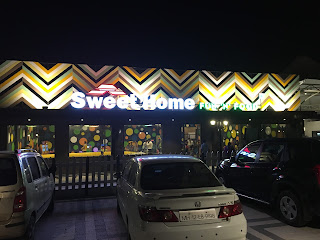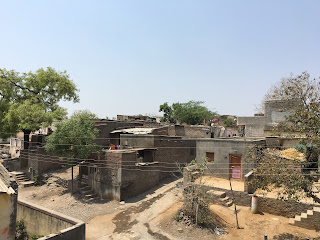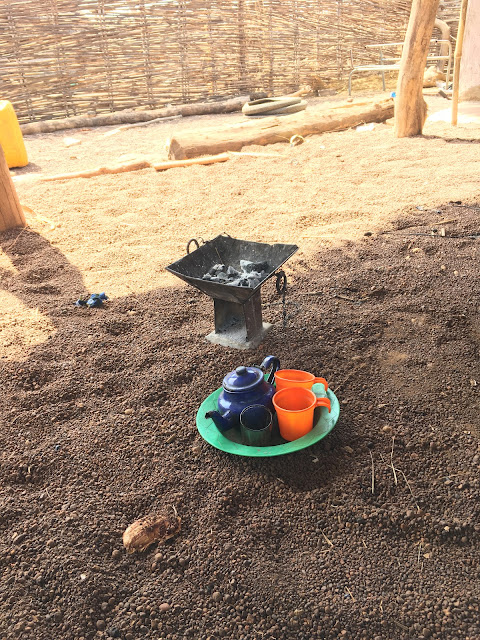Field Visit to Pune, Aurangabad, and Dhule: Mar 31 to Apr 5
Note: I am will not have internet access from April 23 – May
5 as I am going to Kolhapur for a Vipassana meditation course. I am a couple
weeks behind on my blog but will update it when I return to Mumbai. Now back to
the regularly scheduled post...
I woke up early in the morning on Friday, March 31 to travel
to Pune. I traveled with Anameka, a fellow CTARA student at IIT Bombay who also
had some project work in Pune. As usual, we took the local train to Thane, the
nearest station where the Mumbai Pune Intercity Superfast Express stops. The
female voice that announces stops and trains over the intercom is common to all
stations—the accent and word choice is enjoyable. In the name of this train,
the emphasis on “Superfast” is great. My favorite is when the voice says
“Please mind the gap between the footboard and the platform while alighting
from the train.” I think I have only ever heard the word “alighting” said by
those who speak UK English. Listening to these announcements sometimes remind
me of when I was in London in 2014. The first Underground train I got on was
the “Picadilly line to Cockfoster,” as the loudspeaker informed me. When I
heard these words, I knew I could be nowhere but London.
Last time I rode to Pune, I rode in 2nd Sitting
class where I was assigned a seat on a bench next to the window. It was great
until the sun began beating through the window. This time, we rode in AC Chair
Class. It must have been 50 degrees (F) inside the compartment—and this is the
only time I chose not to bring a jacket on my field visit. I spent a decent
amount of time at the open door of the train soaking in the early morning sun
to warm up, holding on as I watched the beautiful scenery rush by, dry shades
of yellow and brown stretching through the valleys to the horizon. Upon
arriving in Pune, Professor Sardeshpande picked me up and we went to visit a
small spice roasting enterprise and a manufacturer who is building a test setup
for my project. At the spice roaster’s place, I tried some jaggery that melted
in my mouth. On impulse, I bought a 1kg package to bring back to the US. This
unrefined sugar is much healthier than white sugar and I plan to try baking
some cookies with it when I return home. It is common here in many sweets. In
between our two meetings, we had a delicious lunch at Professor Sardeshpande’s
home cooked by his wife. The lunch included a cashew sabzi, salad with some
masala from the spice roaster we visited, dal, and green mango juice. The
cashew sabzi was especially flavorful and spicy (I had three servings). I have
never had a cashew dish that good in a restaurant.
In the evening, I took an AC Shiv Neri bus (government bus) to
Aurangabad. It was one of the more expensive forms of travel I have taken so
far in India, about 110 Rupees per hour of travel. The 6-hour drive was fairly
uneventful. Our bathroom stop halfway through the drive was at a place that
looked a lot like Family Fun Center or Chuckee Cheese’s (what I imagine this
is; I have never been there) for kids up to about age 12. It looked very out of
place on the Indian highway. There are some great things that the US has that
India does not, but I would not say that this type of venue is necessarily one
of them. Neither is McDonalds, which is quickly establishing itself at rest
stops along the Indian highways I have traveled. In the US, food generally
tastes the same across the country. In India, food at two places one block
apart can taste wildly different. Why should there have to be one solution for
everyone? What is wrong with different? India is following the US in terms of
establishing chains—whether it is for better or for worse remains to be seen.
Upon arrival in Aurangabad at 12:30am, there was some
confusion about where the MIT College guest house, my staying arrangements for
the weekend, was located. Shilpa had already reached the guest house, having
come from Mumbai earlier in the evening. My auto driver took me to MIT College,
where I asked some guards about the location of the guest house. It took four
guards and two students who happened to be going by on a motor bike to
determine the location of the guest house. The guest house is in an area called
“Kasliwal Marvel,” but I thought it was “Kasliwal Marble,” so when I Googled
this, I found a lot of marble shops about 1km down the road and knew this was not
right. I fell asleep quickly in the air-conditioned room with the comforter up
to my neck. It is amazing how much of a difference AC makes; in my hostel on
campus at IIT, I have taken only cold showers and have never used my blankets
since the start of March.
On April Fool’s Day, which does not appear to be a common
day for pranks in India, Shilpa and I visited a turmeric processing plant in
Aurangabad. This plant is similarly designed to the plant in Kolhapur, but is
facing different issues than that plant was facing. We took a survey of the
operations at the plant to make note of issues that should not go wrong in the
new plant being installed in Waigaon village. It was an exhausting day after a
short night of sleep, so we bought some Maggi for dinner. Maggi is the Indian
equivalent of Top Ramen, complete with a masala flavor packet. The MIT guest
house bungalow we were staying in did not have a stove, so Shilpa went next
door to the guest house bungalow where six Bhutanese students are living for
the semester while they work at MIT College. The Bhutanese exchange students
offered me some chicken that they had cooked, and I accepted. The chicken was
cooked with chilis in a brown sauce and it was the spiciest food I have ever
had in India. My nose was running, my eyes were watering, my face was flushed,
and I was sweating. By the time I started eating the chicken and peppers, I
only had a little bit of Maggi left on my plate to cut the spice, and this made
it all the more intense. It took many minutes for my mouth to be okay again.
The next day, Sumit arrived in the morning from Mumbai. The
three of us went to Jalgaon village for the day, the village where Shilpa and
Sumit spent 9 weeks last summer for their CTARA summer field stay. We hired a
car for the day to take us to the village and back (about 100km round trip)
after learning that the 8:00am train in the direction of the village was two
hours delayed. The residents of the village were all very excited to see Sumit
and Shilpa again. They welcomed us into their homes, offering water, sweet lime
juice tea, fruit, and vegetables fresh from their farms. We spent the day
touring the village and interacting with the. I have heard much from Sumit and
Shilpa about their village stay; it was great to meet the people and see the
places from their stories. When we went to the day care, I was told to put two
drops (and only two drops) of a small bottle in a toddler lying on the table’s
mouth. After I followed instructions, I asked what the liquid was, and learned I
had just administered my first polio vaccine. Shilpa, Sumit, and the Sarpanch
(elected village leader) took their turns with other kids. The one-year-old
child I gave a vaccine to was the least squirmy when lying on the table. He
must have either been in a good mood or not sure what to think of a person with
skin the color of mine.
We ate lunch at the house where Sumit stayed during the
field stay, inhabited by Akka, a woman in her late 40’s, and her mother. She
cooked us a generous lunch of dal bati, bhindi, rice, and papad. Dal bati is
eaten not with rice, but instead with a baked loaf which is subsequently
crumbled so that it can be mixed with dal. As I lay down after lunch to rest,
Akka asked me—through a translator of course—questions about my visit to India:
why I came to India, why I like it here even though the people are poor. Then
the sweetest line of the day came: Akka said “There were Mughals, then there
were Britishers, and now one of them is in my house, enjoying my food. I am
happy.” Hearing this made me emotional. I am incredibly grateful for the
gratuity that the villagers in Jalgaon expressed toward me, an outsider to
their community. They have very little, but they do not hesitate to give all of
what they do have to their guests. After visiting Jalgaon village, I am even
more excited for my village stay later in May in Sangrun, near the city of
Pune. There is much more to write about the village, but due to my blog writing
deficit, I must cut the description short here.
My final day in Aurangabad consisted of a visit to the spice
roasting factory I have previously visited, a meeting with the principal of MIT
College, and dinner with the Bhutanese exchange students. Of the Bhutanese
students here, one is a boy that stays in the same guest house that I was in
and the other six are girls who together share the other bungalow. The dinner
they cooked was great; my favorite dish was a spicy white curry with potatoes.
I also got to try their special chili sauce made with small dried fish, carried
all the way from Bhutan. I did not want to leave their company but eventually
had to return to my bungalow to sleep and prepare for an early morning bus
ride.
The next morning I rode to the bus station on the back of
the guest house keeper’s motorcycle. It was the first time I have felt the wind
through my beard. I asked at the enquiry desk which bus was going to Dhule, and
got the response of “that one, go fast” as the man at the desk pointed to a bus
pulling away from the station. I ran up to the moving vehicle and banged on the
door, at which point I was told to stand back for a few seconds as the bus
finished its reverse maneuver. I waved goodbye to Sachin, the MIT guest house
keeper, and a random woman between he and I waved back at me. When the ticket
collector came to my seat, I had learned my lesson and said I was going to
“Dhule Dhule.” They understood me on the first try this time. We took a
slightly different and bumpier route this time than my bus had in February. I
have for the last month been shifting my daily exercise to 10,000 steps a day
due to the heat, and I was happy to see that 30 minutes on the bus gave me
7,247 steps. Almost done with my daily goal without even moving. I flew out of
my seat on multiple occasions while holding onto the seat in front of me. I was
afraid my head was going to hit the ceiling, so I held on tighter.
The ride was only 3.5 hours, so I arrived well before lunch.
Near the bus station I bought an NFL Vintage Collection Colts hat for 50
Rupees. I had a great two days in Dhule, working with a manufacturer there and
staying with his family in their home. His wife again cooked many excellent
meals for me and I got a lot of time to interact with their kids, playing
badminton in the street outside their house, moving aside whenever a motor bike
came down the road. It was the first time I have played badminton with a birdie
made of real feathers rather than plastic.
My train ride back to Mumbai in third AC class was pleasant
except for the incredibly loud snoring of two passengers near me. Luckily, the
sound of the moving train drowns out most of the noise. I put in my headphones
to cover the rest and had a few hours of sleep before the train arrived back in
Mumbai.
 |
| Rest stop on the way from Pune to Aurangabad |
 |
| Turmeric drying in Aurangabad |
 |
| Akka's home in Jalgaon village |
 |
| Akka's home (green building on the right) |
 |
| Gate in Jalgaon village |
 |
| Shilpa administering a polio vaccine |
 |
| Day care in Jalgaon village |
 |
| Jalgaon village |
 |
| Baby goats in Jalgaon village |
 |
| Villagers watching Sumit and Shilpa's final video presentation from their field stay in Jalgaon village |
 |
| Shipping container house, Aurangabad |
 |
| Welcome in Dhule |



Comments
Post a Comment